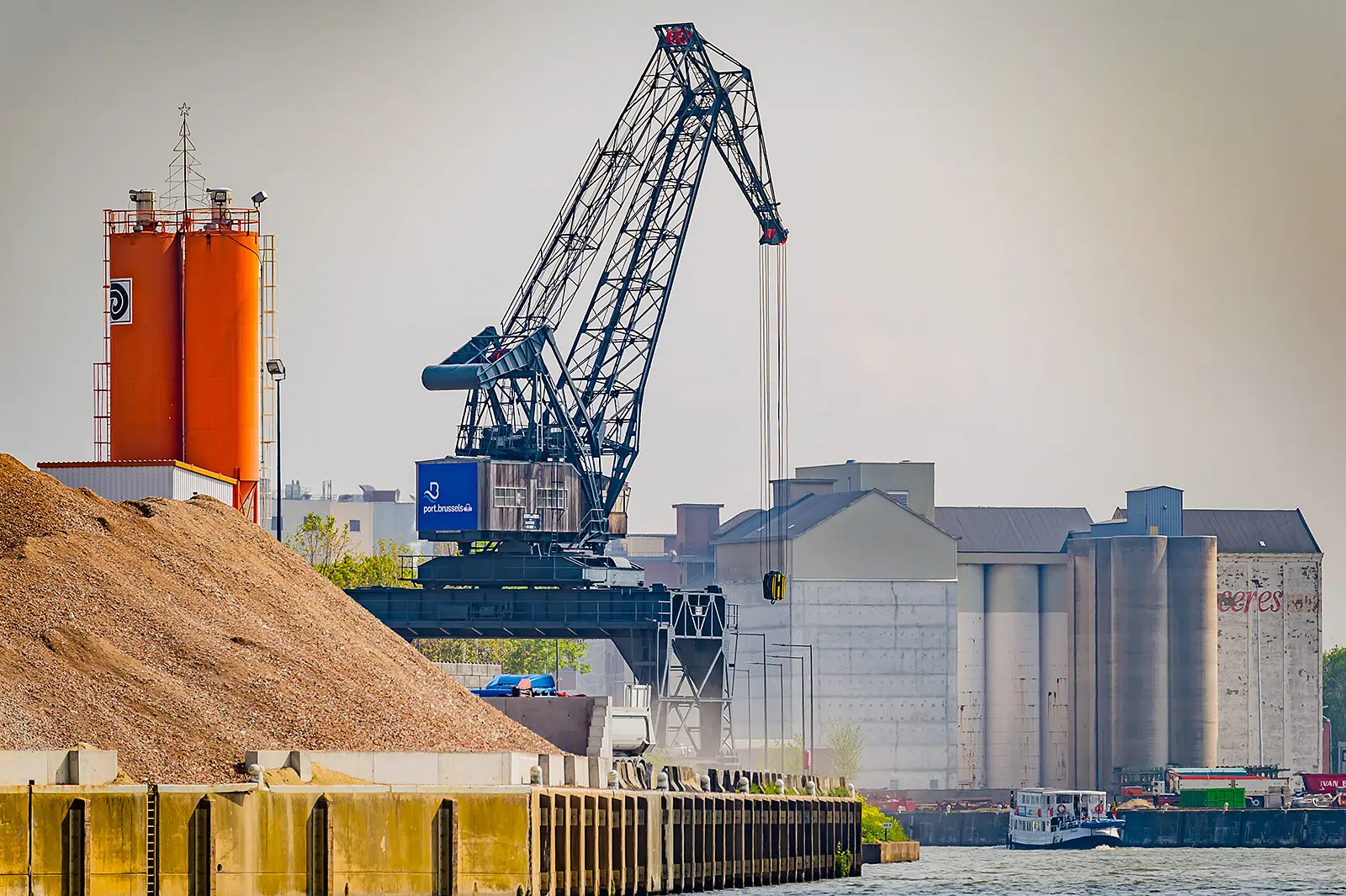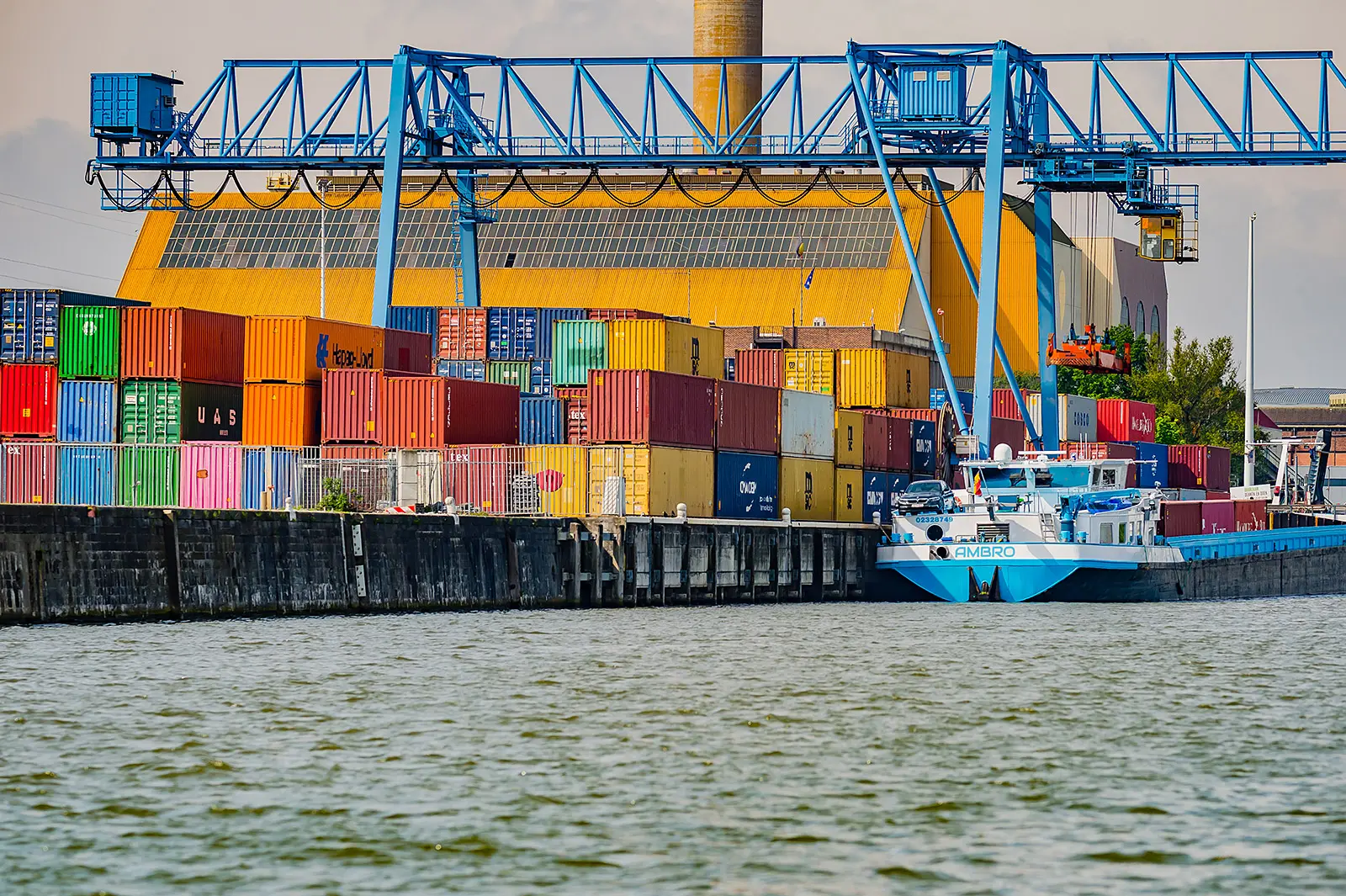Port of Brussels
The Port of Brussels is the pulsing heart of the city and the canal its vital artery. Crossing from one side of the capital to the other for over 14 kilometres, the canal serves a port area of 116 hectares: an economic hub, centre of nautical entertainment and a sea port.
The Port of Brussels aims to encourage transport by water (as the most environmentally friendly mode of transport) create jobs, take action against global warming and improve urban distribution.
It is Belgium’s second inland port, and only a 5-hour sail from the Port of Antwerp. Its quays stretch for 8.67 km, along the waterway that crosses the Brussels region from north to south. The port cluster is home to 350 companies and provides employment, either directly or indirectly, to almost 8,000 people!
As port operator, the port is also responsible for maintaining the canal and its infrastructures.

Missions
Port operator
The Port of Brussel is a “landlord port”. It owns the land within its estate, which it then rents for a fixed period to companies and individuals, for their economic activity.
Concessionaires located along the waterway must commit to using the waterway for their business. They receive preferential tariffs or penalties depending on the tonnages transported by canal.
The Port also manages the TIR Logistics Centre, a large complex offering very competitive rates on all kinds of storage.
Waterway Manager
The Port of Brussels is also the canal manager. Funded by the Brussels Capital Region, this public service activity includes the management of 3 mobile bridges (Buda, Gosselies and Hospices) and two locks (Molenbeek and Anderlecht). The port also takes care of the maintenance of the quays and banks, as well as dredging the waterway.
These activities are carried out by the Port’s technical departments and the operational departments of the Harbour Master's Office.
Logistics services and urban distribution
The Port also acts as logistics expert for the Region, helping to switch road transport to eco-friendly modes of transport (waterways, rail, etc.). The Port sends a free transport consultant to companies ready to take on this challenge.

Vision
Accessible 24/7, the Port covers a huge area of 107 hectares (more than 150 football fields) along the Charleroi-Brussels-Antwerp canal.
The Port is an essential engine of economic, industrial and logistical development for Brussels. It provides the city with nearly €1 billion of added value, representing about 2% of the wealth created by the Region. Its facilities accommodate some 200 concessionaires, and the port cluster is home to 350 companies. The main activities represented on the site are transport, logistics and industry.
It provides a pool of jobs accessible to the least qualified, under 25s and city residents.
The Port of Brussels: the heart of the capital, at the heart of Europe
As a regional public interest organisation, the Port clearly reflects Brussels' economic, social and environmental ambitions: a sustainable and circular economy, logistics solutions for a more pleasant city, better integration of waterways into the Brussels landscape.
As a customs, warehousing and distribution centre, the Port plays a key role in servicing the city. It facilitates river and sea navigation and is connected to an important motorway junction and a very dense rail network, while being close to the Brucargo air terminal.
Thanks to its exceptional location, the Port of Brussels continues to attract more and more dynamic companies. Not only that, the site is also dedicated to relaxation and sport, for everyone.
A major player in continental transport
Think Brussels, think Europe! As a founding member of the EFIP (European Federation of Inland Ports), the Port of Brussels plays a key role in the trans-European transport network (TEN-T), particularly in terms of developing combined transport.
The Trans-European Transport Network (TEN-T) is a programme for the development of the European Union's transport infrastructure to facilitate and boost trade, in particular through the full interoperability of the various networks (land, river, air), and thus allowing the creation of a genuine single market, increasing the share of the most eco-friendly transport methods, and accelerating the integration of the new Member States.
This ambition underpins all of the port’s modernisation and development projects: expansion of the domain, new warehouses, urban distribution centres...
A European logistics centre
With its proximity to the European institutions, strong transport network, cosmopolitan spirit... Brussels has many assets. Being just a stone's throw from the city centre, the Port’s location is ideal. Many clever companies have already seen the opportunity and set up their distribution centres there.